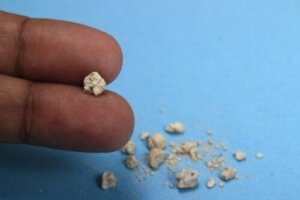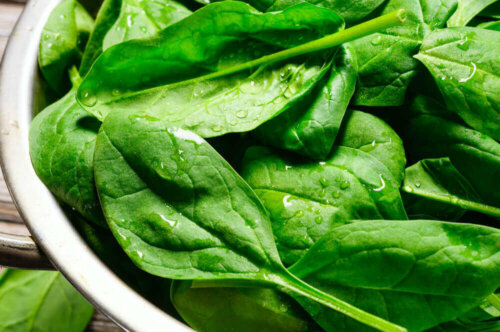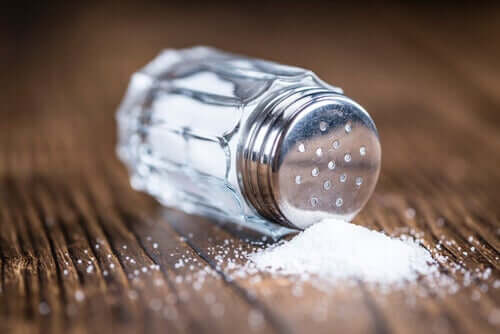Five Types of Food that Cause Kidney Stones

Several things can cause kidney stones, solid fragments that while small, can’t get out of the body on their own. In fact, they often get stuck in the urinary tract and lead to pain.
They’re formed when some chemical substances concentrate in large amounts in the urine, giving rise to crystals. In most cases, such stones originate when calcium combines with oxalate or phosphorus. However, they can also be formed by uric acid, a waste product that forms as the body metabolizes proteins.
In this regard, it’s important to know that certain foods and beverages are the sources of those chemical substances that lead to the formation of stones. For this reason, you should establish what types of stones there are and which foods tend to cause and worsen them.
Types of food that can lead to kidney stones
According to a publication in Clinical Nutrition Research, dietary assessment plays a very important role in both the prevention and treatment of kidney stones.
Together with a physician or nutritionist, it’s important to evaluate the dietary intake of calcium, oxalates, sodium, proteins, and other foods that may be promoting the formation of these stones.
However, since prevention is better, we want to share some of the foods that have been identified as possible triggers of kidney stones. You should try to avoid these foods or consume them with caution, especially if you’re prone to kidney stones.
Read about Mineral Salts: What They Are and Where to Find Them
1. Certain vegetables can cause kidney stones
Vegetables are essential foods in all types of diets. They’re low in calories and contain significant amounts of vitamins, minerals, antioxidants, and other health-promoting bioactive compounds.
However, some varieties contain oxalates and experts don’t recommend them if you have kidney stones. According to information in Harvard Health, these include the following:
- Beets
- Spinach
- Rhubarb
- Sweet potatoes

2. Red meat and animal protein
Animal-based protein and fat are associated with the formation of kidney stones and kidney damage. This is why a study published in The Journal of Urology suggests that its consumption should be limited or avoided if you have kidney stones.
This food is also high in uric acid and purines. When these levels are too high, you can get gout or kidney stones. To a lesser extent, we recommend limiting your consumption of other meats such as chicken and fish.
3. Artificial sweeteners
You use them to sweeten your desserts and teas. They’re in diet drinks, and we can find them in many low-calorie foods. While we may think they’re better for us than sugar, they have many serious side effects on your health.
According to a publication in the National Kidney Foundation (NKF), although safe doses have been established for their consumption, there’s controversy over findings that suggest a link to health problems.
As for the renal system, they’re related to a decrease in the functionality of the kidneys, which can lead to the formation of kidney stones.
4. Excessive salt can cause kidney stones
One of the most common problems in people’s diets is their sodium intake. Even if you don’t add it to the food you make yourself, prepared foods have way too much sodium. It’s even in sweets!
Eating too much salt promotes fluid retention and the formation of kidney stones, as detailed in a study published in Nutrition Journal. Therefore, you should review the foods you eat and try to limit as much as possible those that contain too much salt.

5. Seafood
People predisposed to kidney stones should avoid foods high in oxalates. This organic compound contributes to sodium and calcium accumulation in the kidneys. The food that contains the most oxalic acid is seafood. For this reason, UW Health advises limiting its consumption.
Read about the Benefits of Almond Milk and Some Side Effects
Consult your doctor
The perfect diet to fight and prevent kidney stones may vary from one patient to another, depending on the types of stones and the person’s current state of health. Therefore, in addition to limiting the foods mentioned above, it’s essential to consult a physician or nutritionist.
Both professionals will be able to provide guidance on how to improve habits to avoid this condition. In addition, they’ll help you get on an adequate diet, based on foods that reduce your risk.
All cited sources were thoroughly reviewed by our team to ensure their quality, reliability, currency, and validity. The bibliography of this article was considered reliable and of academic or scientific accuracy.
- Han H, Segal AM, Seifter JL, Dwyer JT. Nutritional Management of Kidney Stones (Nephrolithiasis). Clin Nutr Res. 2015;4(3):137–152. doi:10.7762/cnr.2015.4.3.137
- Gul Z, Monga M. Medical and dietary therapy for kidney stone prevention. Korean J Urol. 2014;55(12):775–779. doi:10.4111/kju.2014.55.12.775
- Tracy, C. R., Best, S., Bagrodia, A., Poindexter, J. R., Adams-Huet, B., Sakhaee, K., … Pearle, M. S. (2014). Animal protein and the risk of kidney stones: A comparative metabolic study of animal protein sources. Journal of Urology, 192(1), 137–141. https://doi.org/10.1016/j.juro.2014.01.093
- Johnson RJ, Perez-Pozo SE, Lillo JL, et al. Fructose increases risk for kidney stones: potential role in metabolic syndrome and heat stress. BMC Nephrol. 2018;19(1):315. Published 2018 Nov 8. doi:10.1186/s12882-018-1105-0
- Damasio PC, Amaro CR, Cunha NB, et al. The role of salt abuse on risk for hypercalciuria [published correction appears in Nutr J. 2011;10:63]. Nutr J. 2011;10:3. Published 2011 Jan 6. doi:10.1186/1475-2891-10-3
This text is provided for informational purposes only and does not replace consultation with a professional. If in doubt, consult your specialist.








